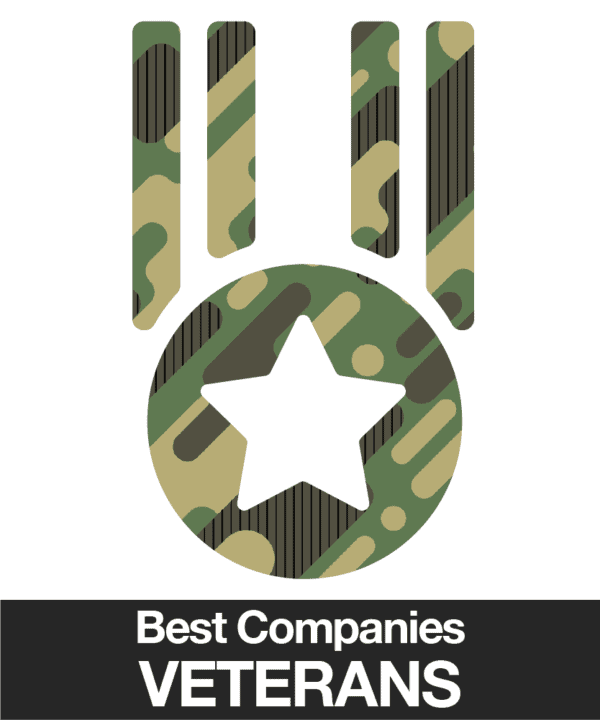If you’re curious about working in customer service, you’ll want to learn about what it’s like first.
What are the daily responsibilities? Are there unique skills customer service positions require? What kind of education do you need to apply for entry-level positions?
To guide you towards a career in customer service, we’ve compiled this comprehensive guide on customer service. Keep reading to learn more about customer service overall, types of roles, customer service skills, and more!
What Working in Customer Service Looks Like

Benefits and Challenges of Working in Customer Service
Before you accept a position at a company, you should consider how you can mutually benefit, and what challenges you may face. Below, we take a closer look at the benefits and challenges that customer service professionals experience.
Benefits
Customer service, in its simplest form, is solving the problem a customer brings to you. At times, this might seem more than a little challenging, especially if you’re new to the role.
However, the age-old adage rings true: practice makes perfect. The more time you spend in customer service, the more likely you are to hone your problem-solving skills.
Another benefit of customer service experience to consider is the knowledge you gain about a company. As a customer service representative, you’ll learn about the company’s products and services to help a customer with their issue properly. If you can’t explain a product a customer has an issue with, you may not be able to help them.
Overall, gaining first-hand experience like this is beneficial because it is a transferable skill.
Let’s say that you want to move to a sales position after your time in customer service. If so, you’ll have a distinct advantage over your peers because you’ve had to learn about the company’s products and services in your customer service role.
Challenges
The first challenge that you might think of when thinking of customer service is angry customers.
Understandably, dealing with an angry customer can be hard. Your goal is to keep their business, but when they show signs of frustration, that goal may become more difficult.
One of the best ways to tackle this challenge is to learn how you can properly handle a scenario where a customer is angry.
A tip to keep in mind for situations like this is reflective listening. Reflective listening aims to show a customer you’ve truly heard what they’ve shared. Often, an angry customer wants just that: to be heard.
Another challenge you might face in customer service is being overwhelmed. Depending on what type of customer service you work in, you may find yourself faced with several customers at once.
Knowing how to handle this situation can certainly be stressful. Who do you prioritize, and how can you do it effectively?
One way to deal with this situation is to be transparent with your customers. In this scenario, let’s say you’re talking to several customers at once over the phone.
You might feel the urge to put one customer on hold to check on another, but this may cause more issues than it solves. Instead, explain the situation and ask them if you can put them on hold.
Areas of Customer Service
Customer retention
How well a customer service department can retain a company’s customer base determines its success. Understanding customer retention within customer service first starts with understanding the customer.
This understanding can be achieved by researching your “customer churn rate.” Customer churn rate refers to the rate in which customers are leaving a company.
By determining a company’s churn rate, you can determine how fast—or slow—customers tend to leave. This can also lead you to reasons why a customer might leave. Maybe they didn’t like a service you provided, or they feel they found a better deal somewhere else.
Knowing this information is useful because it can help you improve your customer service processes. Let’s say your average customer leaves because customer service does not reply quickly enough to questions. The solution here would be to begin improving the response time of customer service representatives.
Communication methods
It may seem obvious, but communication plays a major part in customer service. A unique part of customer service communication is that you are often speaking directly to a customer.
As mentioned before, you may end up in a scenario where a customer is frustrated and wants a solution. In this and all other scenarios, what you say, how you say it, and why you say it matters.
Thus, when working in customer service, you need to hone your communication skills as well as develop diverse communication methods.
Proactive action
While most tasks a customer service representative tackles will be reactive, there are some proactive areas to be aware of.
Understandably, proactive customer support may be overlooked for problems in the here and now. However, the aid that proactive support can offer to other customer support services is impactful.
A common example of proactive customer support is a detailed FAQ page. You can easily compile a list of common questions you receive and provide helpful answers that customers can quickly find on a website.
Then, customers find the solution they need or can call for further information on a specific topic. Regardless, proactive support can show a customer that their needs are understood, and that customer service is a resource they can rely on.
Types of Customer Service
The three major types of customer service positions are:
Many companies have a support email address—however, one study shows that 62% of companies don’t respond to customer emails.
By and large, a pro of email customer support is that it’s an easy way for customers to send their questions.
An advantage to customer service positions that predominantly use email is the ability to consider your response.
You can research their question to ensure you provide the best answer, which is especially helpful for complex scenarios.
Phone support
The telephone is a customer service channel. This type of service differs from others because you’re speaking directly to a customer rather than written communication.
Some companies have call centers, while other companies only have a handful of employees who answer customer calls.
This type of position may be appealing if you excel in verbal communication skills or improve them.
Chat
As technology advances, so does the way we practice customer service. A great example of this is a live chat feature on a website.
If you’ve ever visited a website with a chat window pop up, you’ve experienced live chat. This initial message is often automated, but when a customer responds to it, they are directed to a representative.
This type of position is appealing because it combines the live conversation aspect of phone customer service jobs with the written aspect of email support.
Customer Service Careers & Example Jobs

Customer Service Careers
Below, we’ve outlined four unique customer service careers with a brief job description and their estimated salaries.
Customer service representative
- Job description: A customer service representative interacts with and responds to customer questions regarding products or services.
- Estimated salary: According to the Bureau of Labor Statistics, the average annual wage in 2019 was an estimated $34,710*.
Call center employee
- Job description: The duties of this career are very straightforward; a call center agent is a customer service employee who works in a call center. Responsibilities include answering customer calls and researching solutions, using computers, or other resources.
- Estimated salary: PayScale lists the average salary for call center agents as $12.93 an hour or $26,894 annually*.
Technical representative
- Job description: A technical customer service representative works in the customer service department but primarily answers technical questions that a general representative may not know.
- Estimated salary: The estimated salary for this career is $16.25 an hour or $33,800 annually*.
Client relations associate
- Job description: Companies that interact with clients may have client relations or communications employees. The role of client relations is to educate clients about the company’s products and services.
- Estimated salary: The estimated salary of this position is $46,957 annually*.
Entry-Level Customer Service Jobs
The majority of customer service jobs are entry-level, perfect for newcomers to the field. Below, we list common entry-level customer service jobs to get your start.
Retail representative
- Job description: Retail representatives converse with customers, greet customers, prepare sales contracts, and maintain sales records.
- Salary: As of 2019, the estimated salary for this position is $29,360*.
Office clerks or receptionists
- Job description: Office clerks and receptionists perform customer service duties and other clerical responsibilities, including answering telephones and filing records.
- Salary: The average estimated salary for this position is $34,040 annually*.
*Note: These salaries are estimated by compiling data from positions that fit these descriptions and exist across numerous industry verticals. Some industries might have higher average wages for customer service positions than others.
Job Opportunities For Customer Service Careers
Voya Financial
- Job title: Customer service representative
- Responsibilities & description: Respond to customer calls and inquiries promptly. Provides information to clients regarding Voya’s various features or specific plans. Mail literature as requested by a customer.
- Knowledge, experience, and skills required: High-school diploma or an equivalent. B.A. degree is preferred. Has experience in customer service (at least a year), and some experience in a call center setting is preferred. Oral and written communication skills are required.
- Job posting link: corporate.voya.com/careers
U-Haul
- Job title: Customer Service Representative
- Responsibilities & description: Work as part of a customer service team that gives back to the community and environment. Associates in similar positions receive opportunities for growth and advancement in the company, such as a promotion to Assistant and General Manager positions. Responsibilities include interacting with guests in a friendly manner. Additionally, this role requires you to be attentive to the needs of a customer and inform your teammates.
- Knowledge, experience, and skills required: High-school diploma or equivalent. Must have a valid driver’s license and must show the ability to maintain a good driving record if required to drive motor vehicles.
- Job posting link: obs.uhaul.com
Customer Service Qualifications & Experience: What to Include on Your Resume

What Customer Service Experience Can I Include?
To start working in customer service, you want to put together the most appealing resume possible. A key part of polishing your resume is including relevant skills and experience.
You might ask yourself, “what counts as customer service experience?” Even if you haven’t worked in a customer service-centric role, you may have relevant experience.
Have you worked with customers in any capacity at past jobs? If so, don’t forget to include this experience on your resume!
Customer Service Skills List: Skills to Feature on a Resume
- Knowledge of any relevant software/programs. Examples of this are database platforms, Microsoft Word, Zoom, and more.
- Any relevant problem-solving skills you possess. This can even include any academic experience you might have.
- Ability to focus on specific goals when helping a customer.
- Experience or training in areas such as body language, tone, or active listening.
- Experience or skills that involve dealing with a surprise or unexpected scenario.
- Emotional intelligence with coworkers and/or customers.
Entry Level Customer Service Resume Example (click for more information)
Your Name
Contact
Phone: 123-456-7890
Email: ehjohn@gmail.com
About/General Experience Summary
Over 2 years of experience as a Front Desk Customer Service Representative. In that time, I gained experience in answering telephone calls, sending and receiving customer emails, managing logs pertaining to customer information, and speaking to customers directly. I am familiar with Office software, including Microsoft Word, Excel, and Google equivalents. I strive to use these skills to further my growth within your customer service representative role.
Education
B.A. ENGLISH
Arizona State University
Tempe, Arizona
2019
Skills
- Microsoft Office Suite and Google equivalents.
- Zoom, Salesforce, and similar database platforms.
- Communication skills relating to team training and customer communications.
- Problem-solving experience with customers.
Professional Experience
ABC University, Housing—Front Desk. 2018—Present. Responsibilities included answering the front desk telephone, speaking to residents, logging resident information when applicable, and general clerical tasks.
Trained new hires on information logging processes as well as put together one-sheets regarding changes to current processes.
Aided in the development of new processes to improve customer satisfaction and wait time.
Find the Perfect Customer Service Job For You!
That’s why BestCompaniesAZ has put together a comprehensive list of the best employers in Arizona! We are dedicated to connecting great employers with talented job seekers. In the end, we help form long-term relationships and aid the growth of numerous careers.
If you’re making a career change to customer service, check out the best jobs with amazing employers in Arizona today! Your dream career might be just one click away.
Contact the team at BestCompaniesAZ today and learn more about current job opportunities with the best employers in Arizona!




















